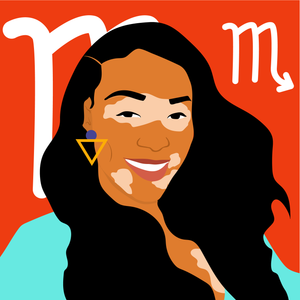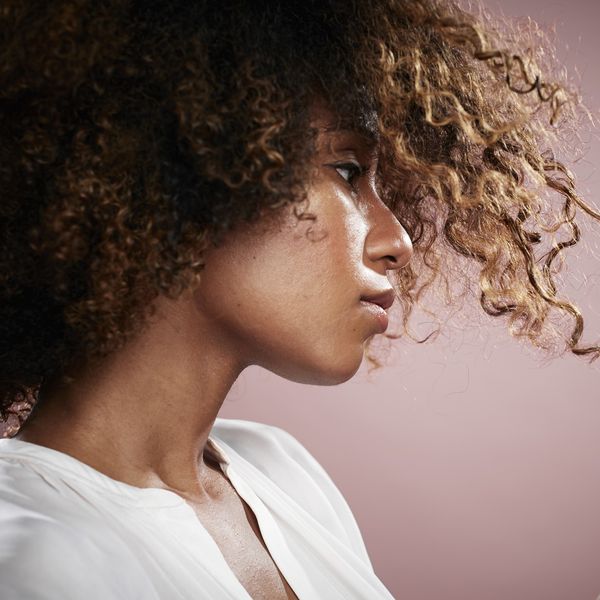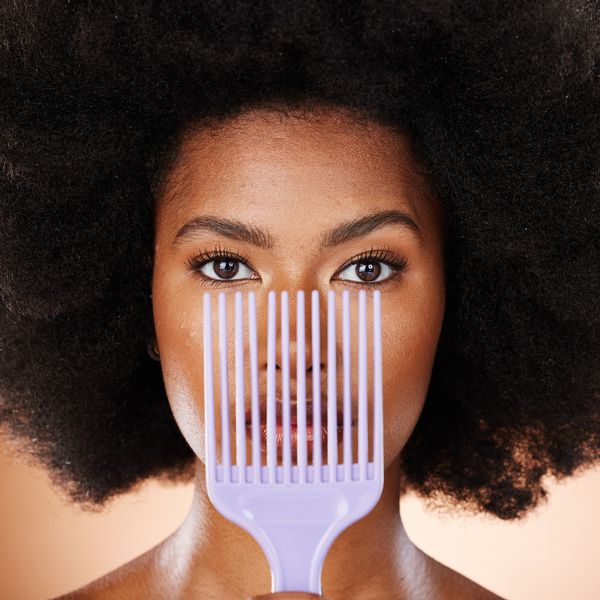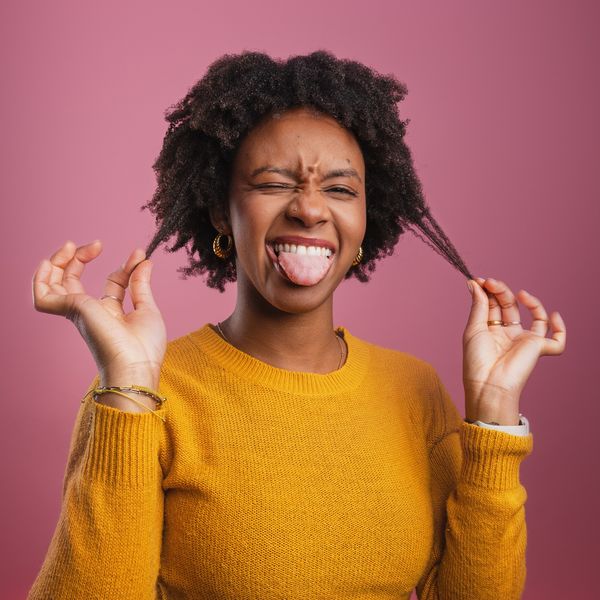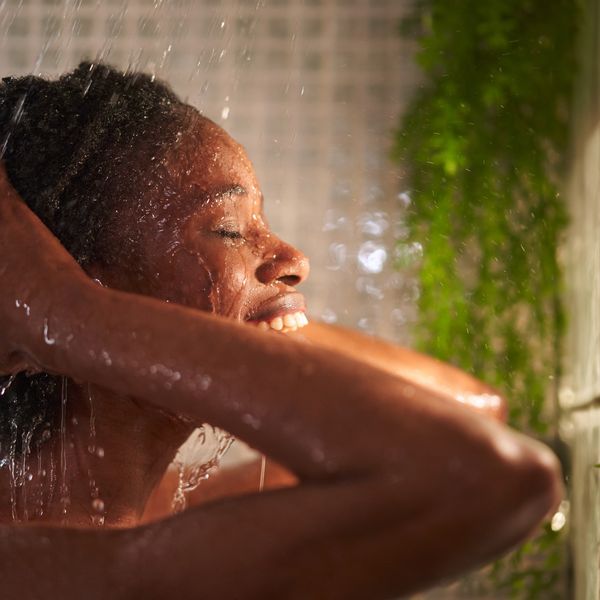
Protective styles are having a great year, something we haven't seen since our beloved '90s IT girls. With the pandemic still looming, social events paused, and work-from-home statuses prolonged, more women are gravitating towards protective styles like box braids, jumbo twists, and locs. We all know how important black hair is, in our culture and the way it's represented in mainstream media and pop culture. Without the prying, and many times judgemental, eyes of society, many women are trying these styles for the first time while in lockdown. There are a plethora of styles to choose from, but right now we're coveting the knotless box braids.
Different from the traditional box braid, knotless braids do not rely on an 'anchor knot' to secure the braid. Instead, a stylist will gradually weave the braiding hair with your natural strands to create a seamless finish that won't put tension on your scalp or ruin your edges. The ease on the scalp coupled with the low-maintenance upkeep makes knotless box braids the go-to protective style.
Whether you're contemplating taking the plunge into the braid world or simply looking to try another type of braid, keep reading for 4 knotless braids trends that give us IG hair envy.
Bohemian Knotless Box Braids
Unstructured and feminine, bohemian knotless braids are very on-trend for 2020. The chaotic and unplanned year is directly reflected in this look, often accompanied by yarn, thread, or small accessories like gold clamps. To create a less uniform look, make each braid a different size, and leave the ends loose.
Brandy
Aspen
Khat Brim
Ombre Knotless Box Braids
One of the dopest things about box braids is the harmless ability to play with color. Ombre knotless braids interweave darker and lighter braiding hair, much like the traditional ombre process, to create a beautiful multidimensional shaded effect. This style adapts to suit your face shape, as lighter pieces can be situated to flatter your best features. As we get into the season of muted tones and high necklines, this is a great choice to add a bit of dimension.
Alissa Ashley
Red (or Any Color) Knotless Box Braids
Speaking of color, don't be afraid to go there with your braids. There's nothing more worthy of a double-tap than braids full of color. Red is the hair color trend of fall so the combination only elevates your quarantine style. Don't be afraid to step out of your comfort zone and choose a statement color that turns heads.
The Tori J Touch
Short Knotless Box Braids
This is a low-maintenance look that is chic and sophisticated. Let's be honest: if it's good enough for '90s Brandy, then it's got to be good for us. Knotless braids are already easy on your scalp, the shorter style is even lighter and more comfortable. You can spice this up by adding an ombre color or adorning the ends with accessories.
Silver Hair GH
Pearl The Stylist
Featured image by Shutterstock
- Passion Braids Protective Style Trends, Inspiration - xoNecole ... ›
- 4 Ways I'll Continue To Save Money Post-Quarantine - xoNecole ... ›
- Bored With Your Bundles? This Is The Fall Hair Trend You Didn't ... ›
- Protective Styles Not Working - xoNecole: Women's Interest, Love, Wellness, Beauty ›
- How To Take Care Of Braids - xoNecole: Women's Interest, Love, Wellness, Beauty ›
- Butterfly Locs, Everything You Need To Know - xoNecole: Women's Interest, Love, Wellness, Beauty ›
- 4 Best Braiding Hair Brands To Know & Love - xoNecole: Women's Interest, Love, Wellness, Beauty ›
Because We Are Still IT, Girl: It Girl 100 Returns
Last year, when our xoNecole team dropped our inaugural It Girl 100 honoree list, the world felt, ahem, a bit brighter.
It was March 2024, and we still had a Black woman as the Vice President of the United States. DEI rollbacks weren’t being tossed around like confetti. And more than 300,000 Black women were still gainfully employed in the workforce.
Though that was just nineteen months ago, things were different. Perhaps the world then felt more receptive to our light as Black women.
At the time, we launched It Girl 100 to spotlight the huge motion we were making as dope, GenZennial Black women leaving our mark on culture. The girls were on the rise, flourishing, drinking their water, minding their business, leading companies, and learning to do it all softly, in rest. We wanted to celebrate that momentum—because we love that for us.
So, we handpicked one hundred It Girls who embody that palpable It Factor moving through us as young Black women, the kind of motion lighting up the world both IRL and across the internet.
It Girl 100 became xoNecole’s most successful program, with the hashtag organically reaching more than forty million impressions on Instagram in just twenty-four hours. Yes, it caught on like wildfire because we celebrated some of the most brilliant and influential GenZennial women of color setting trends and shaping culture. But more than that, it resonated because the women we celebrated felt seen.
Many were already known in their industries for keeping this generation fly and lit, but rarely received recognition or flowers. It Girl 100 became a safe space to be uplifted, and for us as Black women to bask in what felt like an era of our brilliance, beauty, and boundless influence on full display.
And then, almost overnight, it was as if the rug was pulled from under us as Black women, as the It Girls of the world.
Our much-needed, much-deserved season of ease and soft living quickly metamorphosed into a time of self-preservation and survival. Our motion and economic progression seemed strategically slowed, our light under siege.
The air feels heavier now. The headlines colder. Our Black girl magic is being picked apart and politicized for simply existing.
With that climate shift, as we prepare to launch our second annual It Girl 100 honoree list, our team has had to dig deep on the purpose and intention behind this year’s list. Knowing the spirit of It Girl 100 is about motion, sauce, strides, and progression, how do we celebrate amid uncertainty and collective grief when the juice feels like it is being squeezed out of us?
As we wrestled with that question, we were reminded that this tension isn’t new. Black women have always had to find joy in the midst of struggle, to create light even in the darkest corners. We have carried the weight of scrutiny for generations, expected to be strong, to serve, to smile through the sting. But this moment feels different. It feels deeply personal.
We are living at the intersection of liberation and backlash. We are learning to take off our capes, to say no when we are tired, to embrace softness without apology.
And somehow, the world has found new ways to punish us for it.

In lifestyle, women like Kayla Nicole and Ayesha Curry have been ridiculed for daring to choose themselves. Tracee Ellis Ross was labeled bitter for speaking her truth about love. Meghan Markle, still, cannot breathe without critique.
In politics, Kamala Harris, Letitia James, and Jasmine Crockett are dragged through the mud for standing tall in rooms not built for them.
In sports, Angel Reese, Coco Gauff, and Taylor Townsend have been reminded that even excellence will not shield you from racism or judgment.

In business, visionaries like Diarrha N’Diaye-Mbaye and Melissa Butler are fighting to keep their dreams alive in an economy that too often forgets us first.
Even our icons, Beyoncé, Serena, and SZA, have faced criticism simply for evolving beyond the boxes society tried to keep them in.
From everyday women to cultural phenoms, the pattern is the same. Our light is being tested.

And yet, somehow, through it all, we are still showing up as that girl, and that deserves to be celebrated.
Because while the world debates our worth, we keep raising our value. And that proof is all around us.
This year alone, Naomi Osaka returned from motherhood and mental health challenges to reach the semifinals of the US Open. A’ja Wilson claimed another MVP, reminding us that beauty and dominance can coexist. Brandy and Monica are snatching our edges on tour. Kahlana Barfield Brown sold out her new line in the face of a retailer that had been canceled. And Melissa Butler’s company, The Lip Bar, is projecting a forty percent surge in sales.

We are no longer defining strength by how much pain we can endure. We are defining it by the unbreakable light we continue to radiate.
We are the women walking our daily steps and also continuing to run solid businesses. We are growing in love, taking solo trips, laughing until it hurts, raising babies and ideas, drinking our green juice, and praying our peace back into existence.
We are rediscovering the joy of rest and realizing that softness is not weakness, it is strategy.
And through it all, we continue to lift one another. Emma Grede is creating seats at the table. Valeisha Butterfield has started a fund for jobless Black women. Arian Simone is leading in media with fearless conviction. We are pouring into each other in ways the world rarely sees but always feels.

So yes, we are in the midst of societal warfare. Yes, we are being tested. Yes, we are facing economic strain, political targeting, and public scrutiny. But even war cannot dim a light that is divinely ours.
And we are still shining.
And we are still softening.
And we are still creating.
And we are still It.

That is the quiet magic of Black womanhood, our ability to hold both truth and triumph in the same breath, to say yes, and to life’s contradictions.
It is no coincidence that this year, as SheaMoisture embraces the message “Yes, And,” they stand beside us as partners in celebrating this class of It Girls. Because that phrase, those two simple words, capture the very essence of this moment.
Yes, we are tired. And we are still rising.
Yes, we are questioned. And we are the answer.
Yes, we are bruised. And we are still beautiful.

This year’s It Girl 100 is more than a list. It is a love letter to every Black woman who dares to live out loud in a world that would rather she whisper. This year’s class is living proof of “Yes, And,” women who are finding ways to thrive and to heal, to build and to rest, to lead and to love, all at once.
It is proof that our joy is not naive, our success not accidental. It is the reminder that our light has never needed permission.
So without further ado, we celebrate the It Girl 100 Class of 2025–2026.
We celebrate the millions of us who keep doing it with grace, grit, and glory.
Because despite it all, we still shine.
Because we are still her.
Because we are still IT, girl.
Meet all 100 women shaping culture in the It Girl 100 Class of 2025. View the complete list of honorees here.
Featured image by xoStaff
'You Both Are Going To Change': Tabitha & Chance Brown On Their New Body Collection & Successful Partnership
Tabitha and Chance Brown are the epitome of Black love. They've been married for 22 years after first meeting in middle school and share a beautiful blended family. The beloved couple is no stranger to talking about their journey to the altar and the ups and downs they've faced together on their show, Fridays with Tab & Chance. Now, they have taken the name Fridays and expanded it into a body collection.
The new collection, which dropped on November 14, features a body wash and a body lotion that complement their fragrances, Her Business and His Business. "We had such a huge success with the fragrance launch, and it’s because of our customers and fans," Tabitha shares in an exclusive interview with xoNecole.
"They asked for body products and we wanted to make sure we listened. But also layering fragrance begins with the body routine." The body wash is $33, and the body lotion is $35. Keep reading below to hear more about Tabitha and Chance's new collection, their body rituals, and what makes their partnership successful.
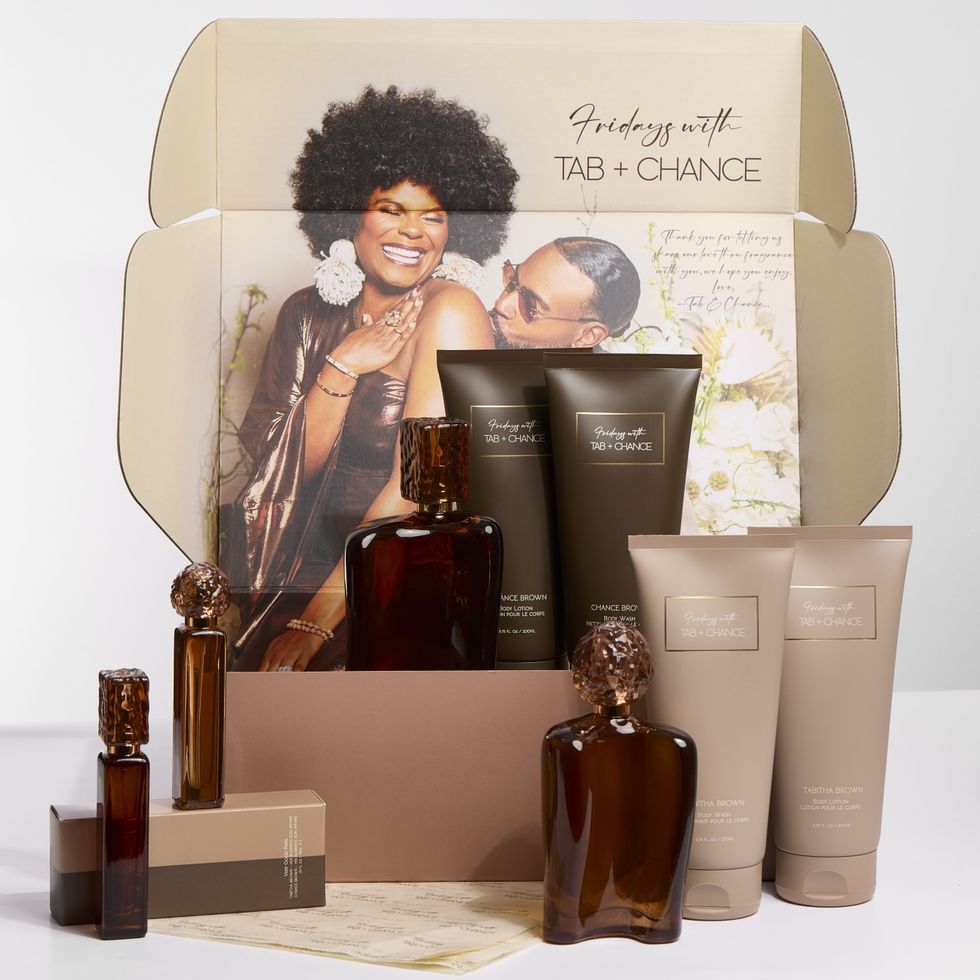
Fridays with Tab and Chance body collection
Marcus Owens
xoNecole: How did you come up with the scents for the collection?
Tabitha Brown: We love warm scents that make you feel sexy and loved. [We’re] both fans of gourmand [scents], including bergamot, vanilla, tonka and chocolate.
xoN: If you could describe your working relationship in one word, what would it be and why?
Tabitha: It's our first time building a product line together and our first time working with fragrance. So having patience with the process and each other has been the best way to build.
xoN: What is your body care ritual?
Tabitha: Exfoliate with a scrub a few times a week, but using a moisturizing body wash daily. After a shower, I spray a body mist that compliments what scent I am choosing for the day. Most times vanilla mist wins because it’s a perfect base for layering. I then hydrate [my] skin with lotion. Then, once dressed, I layer my favorite fragrance, Her Business, first and then His Business on top.
Chance: [I’m] way more simple. Just body wash and lotion and then my cologne and I’m good to go.
xoN: We enjoy watching you two together online, whose idea was it to start 'Fridays with Tab & Chance'?
Tabitha: It actually happened by accident. Back in 2018, my fans had just been asking about how we met, so we did a video answering questions one Friday and people in the comments [asked], will y’all do it again next Friday? And so we did and the next thing you know Fridays with Tab & Chance was born.
xoN: In what other ways do you plan to expand Fridays? Restart the podcast? TV show?
Tabitha: We are working on a lifestyle content show vs the traditional Fridays podcast. More to come soon.
xoN: You do many things together, but what would you say is your favorite quality time activity and why?
Tabitha: We are really simple. We love watching movies or TV series together on the couch or in bed. It’s really one of our favorite things to do together.
xoN: What is your favorite thing about the other person?
Tabitha: I love that he makes me feel safe and how hard he works to be an amazing father.
Chance: I love that she is crazy enough to pursue her wildest dreams.
xoN: What is the key to a successful partnership in business and personal?
Tabitha: The key is knowing that you both are going to change, and giving each other grace, patience, and understanding during those changes.
See more on tabandchance.com.
Feature image Marcus Owens


